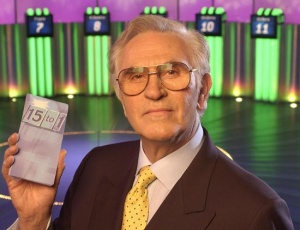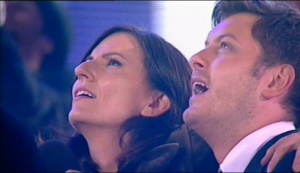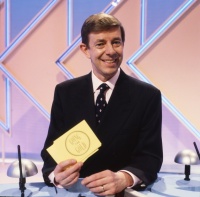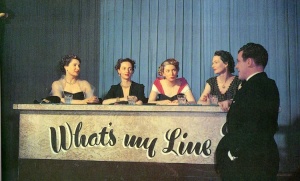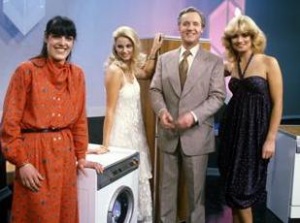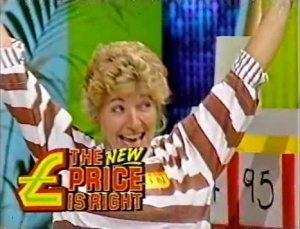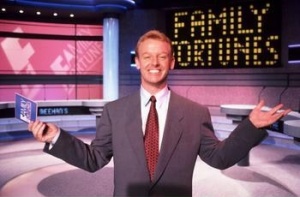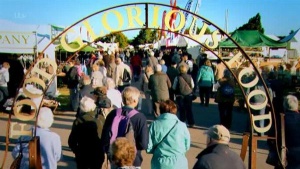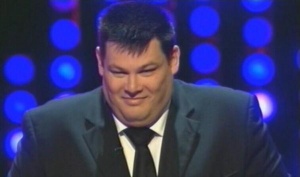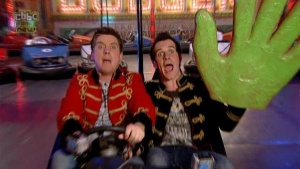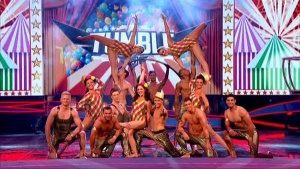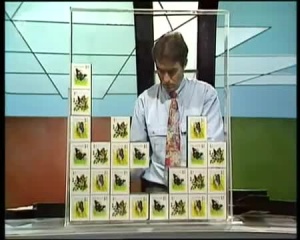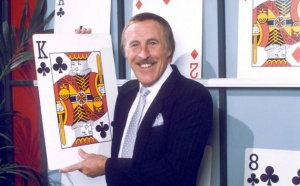Weaver's Week 2014-10-19
Last Week | Weaver's Week Index | Next Week
- Statler: It's impressive that this show lasted 50 years.
- Waldorf: It's impressive this show lasted more than one!
- Both: Do-ho-ho-ho-hoh!
The Game Shows with the Most Contestants, Worldwide, Ever
The learned gentlemen Peake and Wallace posed a question. "Which game show has had the most contestants ever? (In UK, and in world?) Is it 15-to-1?"
Before this week's new series, Fifteen-to-One has had just under 2300 shows. Assuming 13 new contestants per show (one was usually a returning champion, there was a final each series, and other sundry returnees) we get to about 30,000 individual contestants. Roughly. For reasons that will become obvious, we're not going to work at tremendous precision.
University Challenge is in its 44th series, 4 players per team, 24 teams in most series, so reckon about 4400 players. But there are overseas tournaments: the original College Bowl ran for 17 years on television, Challenging Times in Ireland had 12 series, and there have been shows in India. We think Ireland had teams of three, so these take the franchise to around 7500 players.
A smaller count for Mastermind, which only had 48 players per series until 2004. Brain of Britain only invites 24 people per series, and hasn't even reached 1500 contenders.
Countdown has slightly less than 6000 contestants in the UK, plus 10 series in South Africa, 10 series in Italy, 5 series in Greece, and it's been running for (crikey!) 49 years in France. Assuming that most versions have a daily returning champion, we reckon a global total of about 18,000 players.
Reality shows? The World of Big Brother website found 4642 players up to May this year. We reckon they're undercounting the UK figure, the franchise might have found its 5000th player this year. (Leave aside this column's thesis that Big Brother is an experiment on culture: this is people involved in the game on screen.)
We could count everyone who's auditioned for Pop Idol, America's Got Talent, and the ilk, but this feels like cheating. Restricting it to performances where the public votes (semi-finals of about 50 contestants) suggests no more than 10,000 for Idle, 12,000 for Got Talent, and a few thousand for other shows. Eurovision Song Contest has about 2500 songs in its various semi-finals and finals, perhaps 40,000 across all national finals.
The original question was prompted by the observation that over 6500 people have appeared on Eggheads. Another daytime fixture, Going for Gold, started with people appearing for a whole week – we reckon only about 1000 people were seen in the Henry Kelly era. Channel 5 spin-offs One to Win and Going For Gold (2009) will have taken the total closer to 2000. That figure is dwarfed by the French version, Questions Pour un Champion, which runs all year round with three new players each day, so is somewhere around 19,000 players.
What about massive games? 2000 to 1 featured (er) 2000 players. Ultra Quiz in the UK had 1500 across three series, but it's based on Trans-America Ultra Quiz, which had *at least* 50,000 players across its runs.
It's easy to become a legend in Japan: just have a massive hit show and it'll get renewed forever. Takeshi's Castle ran for 133 episodes, upwards of 13,300 players. The fast-moving Quiz Time Shock ran daily through the 70s and 80s, with a modern revival. We've not seen an edition, but the description suggests five teams of three in most games, so easily 15,000 players. Panel Quiz Attack 25 has been a weekly show for 40 years, but even that won't have lifted it about 4000 players.
(Where we haven't been able to find even approximate episode counts, we've assumed that daily programmes make 150 episodes with new contestants per year. That allows for weekly or annual finals, celebrity or other special editions, five months of repeats, and a small number of returning contestants. Contest our assumption.)
Broadcasters in the Americas like to shove on the same programme in the same slot every single day. It means they don't have to think about daytime, and can save their creative energies for primetime. Shows like To Tell The Truth and What's My Line ran for 25 years, but had the same players throughout each week, they can't be above 2500 competitors. (The players here were the people trying to guess the truth or the job, not the civilians attempting to mislead them.)
The early years of television had some right old nonsense. Truth or Consequences, a game of impossible questions and heartwarming forfeits, ran for 39 years. Assuming six contenders per show, the participant total is around 35,000.
Queen For a Day ran from 1945 to 1966, and was like The X Factor without the singing. Four women came up on stage and told their sob story, which could usually be alleviated by some consumer durables courtesy of the show's sponsors. The story most resonating with the audience became queen for the day, and won their heart's desire. Twenty years of this, around 12,000 players, and fewer than ten episodes survive. This may be a mercy.
To the present day, and the big show from down under. Sale of the Century (or Temptation) has been on the schedules most years since the early 1970s. It's sold to the UK, it spent a decade in North America, 5 years in Brazil, and many other editions worldwide. We can see Sale of the Century has had many more than 10,000 episodes, most of which will have had a returning champion, so around 30,000 players.
Biggest regional show might be It's Academic, running for 54 years in the Baltimore—Washington DC area, and about 15 years in Australia. This quiz for schoolchildren takes in 81 teams of three each year, and we reckon it's had just under 20,000 players.
Returning to shows you'll have heard about. Jeopardy! in North America has had about 9700 episodes, at slightly less than two per show (it had retiring champions, but lots of champions tournaments) so about 19,000 players. Foreign versions might take them to 30,000 contestants.
Wheel of Fortune (2) has had 18,000 in North America, 15,000 in Australia, and likely another 25,000 in other foreign versions. Could we declare 60,000 players?
The Price is Right in North America reckons 9 players times over 7000 shows, so 63,000 there. Worldwide, Price is Right might well be pushing 100,000 players.
Family Feud has had over 8400 episodes in North America, each featuring ten players. Long runs in France, the Netherlands, Australia, and the UK, and shorter runs in many other nations bring the total to at least 13,000 episodes. There are 10 players in each episode, but some nations will have had returning teams or players. We can be reasonably sure Feud has had somewhat more than 100,000 players worldwide.
Our back-of-the-envelope calculations suggest the global leaderboard is:
1) Family Feud, more than 100,000.
2) The Price Is Right, perhaps 100,000.
3) Wheel of Fortune, around 60,000
4) Trans-America Ultra Quiz, at least 50,000.
5=) Sale of the Century, Jeopardy!, Fifteen-to-One, perhaps Truth or Consequences, all around 30-35,000 players.
We don't pretend the ranking is definitive, or that our scholarship is thorough and reliable. (We know our scholarship isn't thorough, it's mostly from TV Tropes' Long Running Shows page.)
Thanks for the question! It's given us a couple of shows to go off and find out about, and we'll report back on It's Academic and Panel Quiz Attack 25 in due course.
News From MIPCOM
"We have reached the end of a creative cycle and the beginning of a new one and we all need to seize the opportunities that brings."
The annual holiday for over-worked television executives – er, er, we mean the annual exhibition of television programmes – took place in Cannes this week. We have no budget to attend, but we have a Cannes-do attitude, and we've found out some of the gossip.
No convention would be complete without guest speakers making statements of the blindingly obvious. "Short form is NOT long form, only shorter." Short is an art in itself?
"Content should be 'engaging', and 'not boring'," said one contributor. "Crikey, that's where we've been going wrong all these years!" shouted every television executive across the world. "We've been making all of these shows that are boring and not engaging! What fools we are!"
Maybe we can forgive Simon Cowell for saying "It's more exciting to see someone like Leona Lewis win than looking at a chocolate éclair at the end of the show." A snipe at the all-conquering Bake Off? Or an apologia for Food Glorious Food?
Elsewhere, there was a discussion sponsored by Microsoft computers. "I'll do my best to exploit the windows. But you have an audience that doesn't know anything about them." "Windows won't collapse: they'll co-exist." Try telling this to Taylor Swift's UK fans, who are hopping mad at being denied the pop single of the moment, purely because they're British. Well, they're mad at not being allowed to *purchase* the tune.
"Territoriality will eventually break down," claimed James Murdoch, scion of Rupert. His company decided two decades ago to split the continent into territories by language. Can we believe anyone who comes out with such nonsense as "You can't over-synergise in these businesses", "Never overestimate customer satisfaction with the status quo", and "We have a very flat structure at the top." Yeah, you call him "Daddy".
And so to the Whacky World of Bizarre and Unlikely Formats. From last year's crop, we recognise BBC3's Sexy Beasts, dating while dressed as an animal, which has become a non-game. Here's this year's bundle, and we may have got the wrong end of some sticks.
Dropped: People are left in the middle of nowhere with no food, no map, no help, and start a race to civilisation. By this, we assume "find their way back to", and not "start a new one".
Master Athlete: Contestants compete in various sporty events. They live with each other, one man and one woman in each room, form relationships and alliances. We assume "find the best competitor now" and not "breed a winner for a contest in 25 years".
Flight 920: 20 singles seeking love and adventure get to exotic destinations. Location-based challenges earn some of them tickets to the next destination. The ticket winners decide who else to take with them to the next stage.
Babe Magnet: Four single "guys" vie for the heart of one hot "babe" by answering her questions on sex, love and attraction – while pinned to various ferrous surfaces. Every time the "babe" rejects a guy, she operates a magnetic device to repel them away.
Dating Naked: The antithesis of Sexy Beasts.
Love @ First Kiss: Two strangers walk into a room and kiss, then decide if they want to go on a proper date.
Popped Tin: Four cooks make a meal over a campfire, from food they find in the forest.
Souled Out: Ten people give their "souls" for sale. They have to do what the buyers demand of them.
Midnight Feast: Three cooks have the run of an upmarket department store to grab fancy ingredients, and use them in a three-course meal. Winner gets the prize, losers pay for their ingredients.
Celebrity Takeaway: Five celebrities cook their signature dishes and deliver it to fans. They've ordered it through an app, for extra appalong appeal.
The Algorithm: A player sits a 100-question test before a computer. The player's team are to predict the player's answers to other questions better than the computer does. Ray Foley to host.
Put Brain to Work: The local heart-throb asks the curly-haired geek to write some letters. What happens when the recipients find out?
All-Star Lifeguards: Ten celebrities train to be lifeguards. To be filmed on the beach just outside the MIPCOM arena, where delegates faced torrential rain. It's like Skegness in November.
Celebrity Pole Dancing: They're not learning the polka.
Run and Buzz: A game show involving some running, and a few buzzers. Look, some of these descriptions are even more terse than the headlines on Ceefax.
Keep Your Dog Alive: Contestants try to win a clone of their deceased dog by keeping a porcelain pooch intact. (Yes, an actual live clone of a very dead dog.)
The Stack: contestants pull out blocks and answer questions to win cash, while trying not to topple it
Tug of War: general knowledge in a rope-tugging game show where contestants pull one another down a 'money rail'.
Heaven or Hell: Contestants answer multiple choice questions. If they don't know the answer they descend from heaven to hell and face physical challenges.
Ask Me: A panel game in which all the questions come from pop lyrics. What's up? Am I right? Can you dig it? What time is love?
Would You Pay: Will people buy over-priced luxury goods when they're sold in unusual locations?
100 Years of Wisdom: Quiz for centenarians. Not to be confused with LXXXIV Soldiers of Wisdom, a quiz for centurions.
The People's Choice: Tests how well we know our nation by presenting viewers with the most trending dilemmas like "a week without showering or without their smartphone", "world peace or $1 million" etc. Once the nation has made its choice live, participants must guess what the entire country chose. Keshet and Armoza, the people who brought us The Common Denominator.
Not A Star Yet: Celebrity children do the singing and dancing act. Distributed by Keshet, hoping to cash in on the kudos of the worldwide smash that was Rising Star.
Twitter Play Your Cards Right: The traditional format of Higher! Lower! but played over the microblogging platform.
Hard to Believe: Celebrities get to the bottom of astonishing true stories from everyday contestants. Not a retread of To Tell The Truth. Honest.
Man Versus Fly: One padded cell. One man. One fly. One minute. One thousand quid to kill it. That's a rich reward for the buzzing insect.
This Week and Next
Corpus Christi College Cambridge were represented by Ram Sarjun Rajkumar, Jessica Stewart, Sam Sharma, Caroline Purvis. York sent Jack Alexander, Adam Koper, Alistair Middleton, Joe Crowther, and no ducks. Must be University Challenge. York got the first two starters, CCCC the next two and came within 5 points.
York incurred a *very* harsh penalty for the heinous crime of buzzing just as Thumper finishes the question. Bad host. Naughty. Must do better. Corpus Christi took the lead on the next starter, and a very long time to confer on their bonuses. The Cambridge side were fined for a missignal with the non-answer "Sorry, I didn't mean to buzz." "But you did," Thumper's best comeback of the series.
York have clearly been the better side, not that the score represented it. They pulled away, turning a small deficit into a 60-point advantage. Corpus pull back, and *again* York lose five for buzzing straight after Thumper has finished. This isn't on: it's clear that the host isn't listening properly, or the producers are giving him duff advice.
More by luck than judgement, this doesn't alter the result, York emerge winners by 170-135. York were playing against a decent Cambridge side who would have been at home in the repêchage. York were also playing against the production staff.
No hint of bias in the Only Connect studio. Paul Beecher, Simon Spiro, and Sean Blanchflower are the Orienteers. Owen Rees, Phil Nelson, and Daniel Tuite are the Romantics. Messrs Spiro and Beecher were two-thirds of the Cambridge Quiz Society, yet another team who lost to the Rugby Boys in 2009.
Two points each in the opening exchanges – touchstones for the Romantics, pockets from the music for the Orienteers. The Romantics get a late, late inspiration for Ministries in Nineteen Eighty-Four, but neither side recognises pictures of people whose names are berries. Nor do they recognise Derren Brown shows, but the Orienteers do spot literary works that were all just a dream. They lead 4-3.
We claim five points for the opening connection, hosts of the Senior Eurovision Song Contest, and the nationality of the winning broadcaster. "What song won for Azerbaijan in 2011?" {1} Three for the Orienteers, and massive amounts of egg on Mr. Beecher's face – he wants to host the contest but cannot remember "Euphoria". Or "Only teardrops". On their own question, the Orienteers sound the Five Point Klaxon, knowing that a Close Encounter of the 4th Kind is abduction. Well done!
Bonuses on the next questions: decreasing numbers of stripes nets the Orienteers a bonus point, the meres in the Lake District (ordered by size) sends one to the Romantics. The fates of Edmund Blackadder gets an over-the-top two for the Romantics. The Orienteers are right to spot Playstation symbols, but in the heat of the studio reckon the pink square is yellow.
Orienteers defend a 10-9 lead in the walls, where there are towns in Bedfordshire, football grounds called ____ Road, teachers in the Harry Potter books. Are there types of van for the fourth group? The team took a bit of time to isolate the grounds, but then they were away. Ten points!
For the Romantics, the starting point is Michael Jackson albums. Then it's aircraft carriers, then they're thinking about compound words. Or has there been another Harry Potter link, with Hedwig and the Pigwidgeon? Anagrams of fish is a naughty little group, and the first one they get out. The side completes the wall with a few seconds to spare, and the team's allowed "Companions of Harry Potter characters" – owls, to be specific. Ten points!
So 20-19 to the Orienteers going into Missing Vowels. The Orienteers know far too much about popular game apps, winning 4-0. They take female leaders and their countries 3-1, including the second appearance in two weeks for Angela Merkel, and another two seconds of fame for Kim Campbell {2}. 4-0 on Kurt Vonnegut novels, 2-1 on non-Olympic sports. Wow! The Orienteers have won by 33-21. Blasting away from one point to 12!
{1} Íctami's winning song was .. er .. um .. oh, (checks records) "Running upstairs". Another success for British songwriters and performers, there.
{2} Kim Campbell was prime minister for a brief period in 1993. She still has some of her fifteen minutes of fame to come.
Mastermind was won by Hywel Morgan. He took Steve Reich, the modernist composer {3}, and we could see his irritation when he passed on a question, only to remember it a moment later. That's the only flaw in his round, 13 (1). A mindfade began the second round, couldn't remember the Brontes of Haworth, and though he recovered in the short term, he seemed to wobble for the rest of the round. Picked up enough points here and there, finishing on 23 (7).
Neil Crockford had the Life and Work of Thomas Chatterton, a poet and forger, and made 9 (0). A regular on this show, Mr. Crockford put his head down second time around, grinding to a halt in the last minute, concluding on 21 (0).
Diana Muir answered on the writer Monica Dickens, grand-daughter of Charlie "Fingers", reaching 8 (0). A confident second round kept ticking up to 16 (1). Rod Allday followed The Thames Path to a round that wasn't what he expected – we reckon the contender was more about the villages upstream, the setters went too long on history in London. 7 (6) turned into 15 (6) after a general knowledge round of little note.
We're going to pick a fight with the question-setter who said that the Watford Gap marked the point where the South of England met the West. No: that's South and North. South and West meet somewhere around Leigh Delamere. And cheer the contender who suggested that the UK's first number one album, in 1956, was recorded by Robbie Williams (b. 1974).
{3} Not to be confused with Steve Wright, the historic broadcaster for whom it's always 1981.
BARB ratings in the week to 5 October.
- Normal service is resumed: Bake Off had 10.65m for its semi-final, beating Strictly – 9.95m for the performance show.
- The X Factor managed 7.8m for its results service. Have I Got News for You returned with 5.1m viewers, and there were 4.25m for Pointless Celebrities.
- The Chase With Celebrities (2.85m) was hurt by the dancing, and fell behind University Challenge (2.95m). Only Connect reached 2.2m, Dancing on 2 had 1.45m, and Eggheads fell to 1.1m as it returned to 6pm – that's similar to Two Tribes in that slot last week.
- Top non-PSB game (the digital-era channels) was Celebrity Juice, 1.28m on ITV2. A League of Their Own S8 had 645,000, and Xtra Factor was depressed at 595,000.
- Release the Hounds is a hit for ITV2, 475,000 for this week's edition.
Next week, The Great British Sewing Bee has charity episodes (Tu, Th, Fr). And, er, The Lie returns to TV3 in Ireland (8pm Mon). Saturday falls into its usual groove – Kate Adie and John Sergeant are on Pointless Celebrities (5.45), Strictly Come Dancing is at 6.30. ITV still don't want us to promote The Chase (7pm) with the best Splash! Presenter, The X Factor at 8, and some top actors on Jonathan Ross (10.10).
Photo credits: Regent, Initial (an Endemol company), Reg Grundy, BBCtv, Anglia, Central, SyCo, ITV Studios, TVNZ, Thames, Íctimai, NDR.
To have Weaver's Week emailed to you on publication day, receive our exclusive TV roundup of the game shows in the week ahead, and chat to other ukgameshows.com readers, sign up to our Yahoo! Group.

